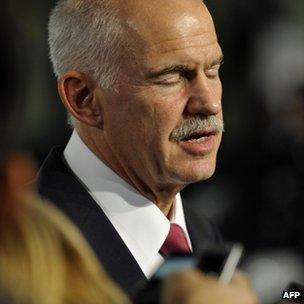Eurozone leaders admit exit from euro is possible
- Published
- comments

Could Greece leave the euro?
Markets are behaving in a way that I find even more baffling than usual.
Naturally I can understand why investors may be taking comfort from the noises out of Greece that a referendum on the bailout deal may be cancelled.
But that doesn't imply that the grip on power of the current Greek government, or of a coalition that may replace it, would be anything other than tenuous.
So whether through plebiscite or general election, the Greek people may yet turn their back on the package their government has agreed of rescue loans and budget squeeze.
But perhaps more importantly, eurozone leaders have for the first time (in my memory) publicly conceded that it is possible to leave the eurozone.
The point about joining the euro is that it is supposed to be forever. And as the new president of the European Central Bank Mario Draghi pointed out today, there is no legal mechanism for withdrawal from the euro.
So it was momentous to hear the German Chancellor Angela Merkel say that "the (Greek) referendum will revolve around nothing less than the question 'does Greece want to stay in the euro, yes or no?'"
Contagion dangers
Certainly I can't recall a European leader, let alone the government head of the most powerful economy in Europe, acknowledging that it is anything other than fatuous to suggest that a eurozone member could revert to a national currency.
What's more, the Luxembourg premier Jean-Claude Juncker, who also chairs meetings of eurozone finance ministers - and has been around the euro scene seemingly forever - went further, saying that the authorities were "absolutely prepared" for the possibility of Greece adopting a new currency in place of the euro.
He added: "It's not only about Greece, it's also about possible contagion dangers for others and we'll do everything…to build firewalls".
Which is absolutely the point.
In and of itself, Greek withdrawal from the euro would be very painful for its creditors, who would incur huge losses, for Greek businesses, many of which would go bust, and for Greek people, who would face the risk of hyperinflation from a collapsing new Greek currency.
Just to give some idea of the scale of losses, overseas banks have lent $131bn (£82bn) altogether to the Greek public and private sectors and have $64bn (£40bn) of contingent and potential liabilities.
So if there were a default on much of these loans, and if they were redenominated into neo drachmas, we would be looking at losses of perhaps £90bn for non-Greek banks.
And then there would be additional losses for the European Central Bank, the eurozone's bailout funds, and the IMF - which (according to Open Europe) have collectively lent around 130bn euros (£112bn) to the Greek government. Losses for European and other taxpayers on all that could be more than £80bn.
On top would be devastating losses for Greek banks - which would be bankrupted - and for Greek and non-Greek investors.
It would be carnage.
Saying goodbye
But it as as well to remember that Greece is a relatively small economy.
The real disaster for the eurozone and for global economy would be if it looked a realistic possibility for a vastly bigger, indebted economy, such as Italy, to leave the currency union.
Italy's government debt on its own is not far short of 2 trillion euros.
The recent rise in the interest rate that Italy has to pay for loans reflects a rise from negligible to possible in investors' assessment of whether they could be paid back by Italy in a currency other than euros.
The implied interest rate that Italy has to pay to borrow for ten years is stubbornly refusing to fall below 6% - which is dangerously close to a rate that is unaffordable and that could tip the Italian economy into vicious cycle of economic contraction.
Quite how that interest rate can be reduced - in the absence of a eurozone bailout fund with firepower vastly greater than the trillion euros of its proposed expansion and after the admission by Mrs Merkel that a country could say goodbye to the euro - well my powers of imagination are failing me.
Or to put it another, in the history of the eurozone, the panicked admission by eurozone leaders that Greece or any country could regain an autonomous currency may turn out to be a very important milestone - and a milestone that may be on the side of the road to ruin.